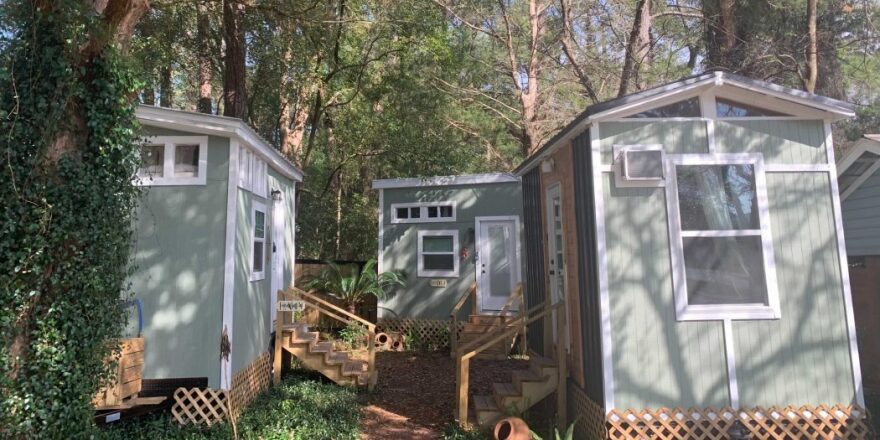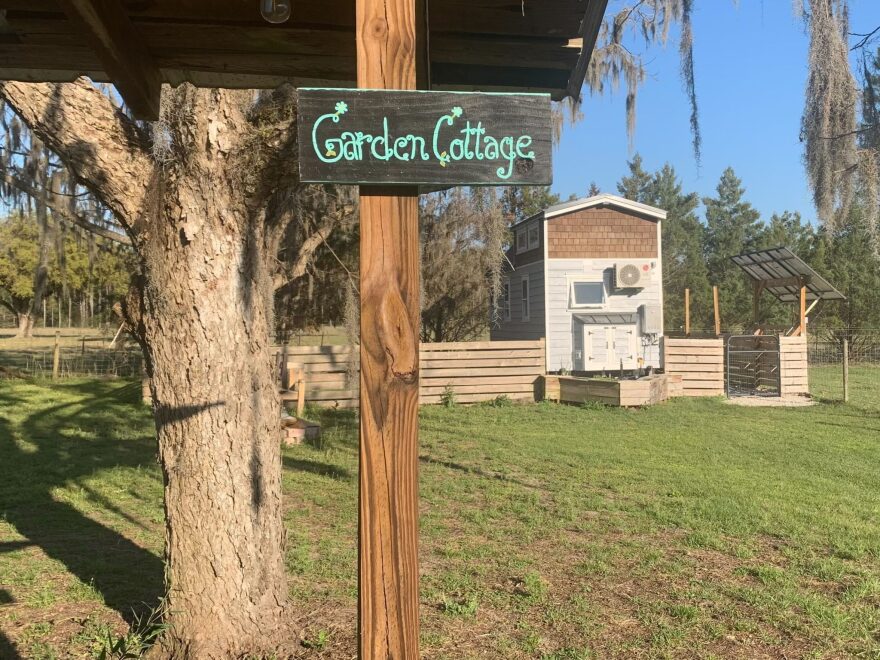"Zoning is Communism," said St. Johns County Commission candidate Johnny Coe Counts, a farmer from Cracker Swamp, at the April 26, 2022 second Growth Management workshop at the County Commission Taj Mahal.
The United Supreme Court disagrees, upholding zoning laws for a century.
It sounds extremist, but we need to discuss and debate zoning.
My father was as Realtor, and I know first-hand from his stories how zoning affects housing.
I agree that some local and Florida zoning law are overbearing.
I agree that Mr. Counts has a point, albeit poorly made with emotional language..
Let the debate on zoning begin.
Harsh regulations on food trucks, tiny houses and duplex and aoartment homes typify the genre of misguided regulations that inflate the cost of housing, making Florida the least affordable state in our Nation.
Let's enforce the Fair Housing Act and take a stand against "snob zoning."
If the late U.S. Department of Labor Chief Administrative Law Judge Nahum Litt (1979-1995), my sagacious mentor, were alive, he would advise me to ask St. Johns County Commissioners about our developer-written zoning laws: "Who benefits?" ("Cui bono?)
From WUSF:
Owners of tiny homes across Florida are seeking peace with local governments

It’s hard to know how many people live in tiny homes, as some choose to live under the radar to escape governmental and legal hurdles.
Krsna Balynas and her husband Govinda Carol finished building their first tiny house in Alachua in May 2020 and listed it as an Airbnb a month later – mostly just to see what would happen. Within two weeks, it was booked almost a month out.
Almost two years later, the couple’s company Simplify Further now rents 12 tiny houses across Alachua County via vacation rental websites: 11 in Alachua City – including four on their own property – and one in La Crosse. They’ve hosted over 7,500 guests.
However, big trouble has set upon them because of it. Balynas, 28, said an Alachua city codes enforcement officer came to their home on Feb. 10, and said she and Carol, 35, had one month to abide municipal regulations or get rid of about half of the houses.
“To come knock on our door, and basically give us 30 days to shut down our entire business and livelihood with no consideration — I felt it to be a little audacious,” Balynas said.
Watch below: Krsna Balynas and her husband have operated their tiny homes company for almost two years. “It actually started back when COVID started and we got our first stimulus check,” Balynas said. “We used the money to build our first tiny home.” (Veronica Nocera/WUFT News)
The couple are one of those in the region who have pursued the tiny home lifestyle or business hustle, and one of many in the state who have faced government pushback.
Tiny houses are typically under 600 square feet, which their owners say allows them to lead simplistic, environmentally friendly lives. The homes can be built on foundations or on wheels, thus offering greater to freedom to travel, and sales boosted during the pandemic.
It’s hard to know how many people across the region and the nation live in tiny homes, as some choose to live under the radar to escape governmental and legal hurdles.
However, the Florida Tiny House Enthusiasts Facebook group has over 15,000 members, and nationally tiny homes have become popular vacation options. Related Airbnb searches rose by 791% between 2019 and 2021, and the properties accounted for 17 of the year’s 100 most wish-listed homes, according to an Airbnb report on travel and living.
But owning or renting a tiny home can be far from stress-free.
Dan Fitzpatrick, 72, is president of the Tiny Home Industry Association, a trade organization founded in 2016. Because tiny homes aren’t typical dwelling units or even technically RVs, their owners struggle to comply with municipal building and zoning codes, said Fitzpatrick, a former longtime city and county administrator.
Some states, he said, are gradually becoming more supportive.
In 2021, Maine passed a law granting tiny homes the same status as single-family dwellings. However, no such statewide law exists in Florida, meaning current and prospective tiny home owners are often at the mercy of where they wish to live in or pass through.
“If you have a good working relationship with your municipal government, you can change some of the codes, rules and regulations so that they become more tiny friendly,” Fitzpatrick said.
For Balynas and Carol, cooperating with their local government has been a struggle.
Their tiny homes do not comply with the part of the International Residential Code that requires tiny homes under 400 square feet to abide by regulations for single dwelling units. The appendix was adopted into the seventh edition of the Florida Building Codein December 2020, though as are all building code appendices, it is applied jurisdiction by jurisdiction.
On Feb. 16, Balynas and Carol met with Alachua City Manager Mike DaRoza and officials from the planning and community development division to argue their case. The couple insisted that the code in question only applies to tiny homes on foundations, and because theirs are on wheels, they should abide RV code, which Balynas said is outside the city’s jurisdiction.
A week later, DaRoza sent Balynas a letter asking her to clarify the use of her structures.
“As you know, numerous names have been mentioned at various times, which have made it exceedingly different for the city to evaluate any issues regarding them,” Balynas read from the letter in a video posted to Instagram Feb. 24. “Please provide specific names for the type of units constructed and the uses for these units.”
Balynas replied that she and Carol would speak with an attorney before engaging further.
“It seems the battle was won but the war goes on,” she wrote in the Instagram caption.
The city was still seeking to resolve the matter and would have no further comment on the matter, DaRoza wrote this week in an email to WUFT News.
Other tiny home owners say they would like to seek changes to related laws.
Robin “Shorty” Robbins, 64, lives in a tiny house in St. Johns County. She’s on the national board of the Tiny Home Industry Association, which is looking to introduce legislation to the Florida Legislature next year. The proposed measure would amend the state Department of Motor Vehicles code so tiny homes on wheels won’t be considered RVs, Robbins said.
“We want to live in our tiny houses full time, so not being registered as an RV is a better thing for us,” she said. “It really is truly an industry that needs to start being looked at and being taken seriously.”
Robbins herself built her tiny home in 2014 and for three years has used it to travel. She said she understands regulations to protect tiny homes from trouble such as natural disasters. But she also hopes governments can see them as a potential solution to affordable housing. In Los Angeles, the homes have been used to combat the cities homelessness issue.
Kurt Hunt, COO of Atlas Cottage Homes, based in Orlando, also said tiny houses can help with a lack of affordable housing, especially with people entering the workforce. His company’s homes are built on foundations, with some in Ocala and Inverness, Citrus County.
“The demand’s outstripping supply, so it’s raising all the rent, it’s raising all the house values,” Hunt said, “so we started building cottage homes … in urban areas, in particular, that lack affordable workforce housing.”
Mike Cheatham, 46, of Melbourne, owns and operates Movable Roots, a family run business that designs, builds and delivers tiny homes. The process can take up to 13 months for the specially designed houses, and he’s sold over 30 houses since beginning in early 2017, Cheatham said. Working with state, county and local governments to educate officials about how tiny houses differ from RVs has been laborious – but necessary, he said.
“The county commissioners are the ones that really make the change,” Cheatham said.
Some areas are more tiny home friendly than others. Brevard County, for example, has amended building and zoning code sections that have allowed for tiny home communities like Braveheart Properties. But with the legal fight related to tiny houses ongoing in many counties, others are helping portable home owners who need a place to park while traveling.
Maureen Murtha, 34, a communications specialist for Gainesville Regional Utilities, has cows, chickens, dogs and tiny homes on her 10 acres of land near Lake Butler in Union County.
While she doesn’t have a tiny house herself, Murtha said she saw people needing a place to park their homes on wheels. At her peak, she has had seven parked on her farm.
“I’ve had single folks, I’ve had couples, I’ve had people that are engaged, people that break up, get engaged – the whole spectrum,” Murtha said. “Lots of different walks of life, lots of different economic backgrounds.”
Watch below: Maureen Murtha allows people to park their tiny homes on her 10-acre property near Lake Butler in Union County. At her peak, she said, Murtha had seven tiny homes on her property, which is also home to cows, chickens and horses. (Meghan McGlone/WUFT News)
Jessica Tittl’s tiny house rests on wheels on Murtha’s farm.
Tittl, 34, who learned about the lifestyle from a documentary on minimalism, moved from her in Ohio to a tiny home in Lake Butler to stop “living that rat race life,” she said. This allowed her to return to school, studying coral reefs at the University of Florida.
“It was a scary thing to do,” Tittl said, “to go from what everybody tells you to do in life and just be like, ‘I’m going to build a tiny house and live on a stranger’s farm.’”
Where Murtha lives, there aren’t many code restrictions or neighbors, and she said there are loopholes for people who have farms, such as allowing multiple family housing on farms to help with work. She said she’s lucky to be able to take advantage of that.
“If you’re cool, and you want to live in nature, minimalist, and you have a tiny house and you like me and you like the property, then it works out,” Murtha said. “All the people that have lived here, for better or worse, became some of my closest friends.”
Mark Cox, 32, used to live on Murtha’s property before moving nearby to rent out his tiny home as an Airbnb. Before that, he traveled the country in his portable house, spending time along the way on a llama farm in Tennessee and on the mountains in North Carolina.
Cox had planned to stay on Murtha’s property for a month before moving on, but he stayed for four years.
“Now I see it as my duty to invite others to come and see it,” he said, “hoping that I can either open their eyes to it, or influence them if they had an idea of building a tiny house.”

No comments:
Post a Comment